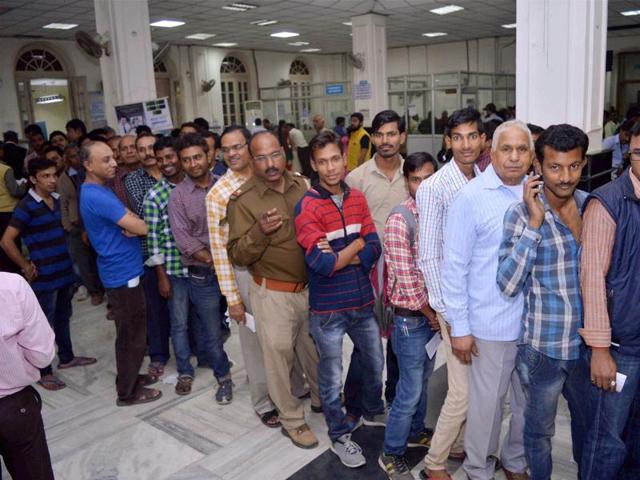Exchange of Rs 500 and Rs 1000 notes ends; can be deposited till Dec 30
The Centre on Thursday extended the usage of old notes for payment of public utilites bill till December 15, but ended the deadline for over the counter exchange of the banned Rs 500 and Rs 1000 notes.
The exchange of old 1,000 and 500 rupee banknotes will no longer be accepted from Friday, the government said, but the use of Rs 500 notes for certain transactions has been extended till December 15.

The Centre, which allowed a window of a fortnight to exchange these currency notes over the counter, has decided not to extend the facility given a decline in exchange transactions.
After reviewing the cash supply situation on Thursday, the Narendra Modi-led government decided to allow payments for certain transactions using the old Rs 500, such as public utility bills of water and electricity. However, this is limited to individuals and households, the statement said.
Rs 1,000 notes will no longer be accepted.
“It has further been felt that people may be encouraged and facilitated to deposit their old Rs 500 and Rs 1,000 notes in their bank account... Consequently, there will be no over-the-counter exchange of old Rs 500 and Rs 1,000 notes after midnight of 24.11.2016,” a statement issued by the finance ministry said.
No changes were announced regarding the deposit of these high value notes in banks accounts, deadline for which remains December 30. People will need to furnish their PAN card details if the total deposit amounts to over Rs 2.5 lakh after December 30.
In a shock announcement on November 8, Prime Minister Narendra Modi said that Rs 500 and 1,000 banknotes were being withdrawn from circulation in a bid to crack down on corruption and counterfeit currency.
However, a string of measures were deployed to mitigate public inconveniences resulting from the ban on the two high-value banknotes, which account for 86% of the currency in circulation in the country.
People are allowed to make ATM cash withdrawals up to Rs 2,500 per day and Rs 2,000 from select fuel pumps of state-owned oil companies. A savings account holder can withdraw up to Rs 24,000 per week from banks. Current account holders can also withdraw up to Rs 50,000 a week, provided it has been in operation for at least three months.
The government also extended the suspension of toll collection on all national highways till December 2 midnight.
Read | How to use old Rs 500, 1000 notes: Toll tax exemption extended till December 2
Among the other decisions announced on Thursday, the government is allowing payment of fees up to Rs 2,000 per student using the old Rs 500 notes in schools under the central and state governments, municipality and local bodies. These notes can also be used to pay fees at central or state government colleges.
The scrapped notes can also be used for topping up pre-paid mobile accounts to a limit of Rs 500.
The government has also allowed foreigners to exchange currency up to Rs 5,000 per week, records of which will be registered against their passports and other documents.
The revised measures come on a day former Prime Minister Manmohan Singh called the implementation of the demonetisation a “monumental mismanagement” amounting to “organised loot and legalised plunder”.
Also read | Manmohan calls demonetisation a failure: Jaitley hits back, Twitter weighs in





